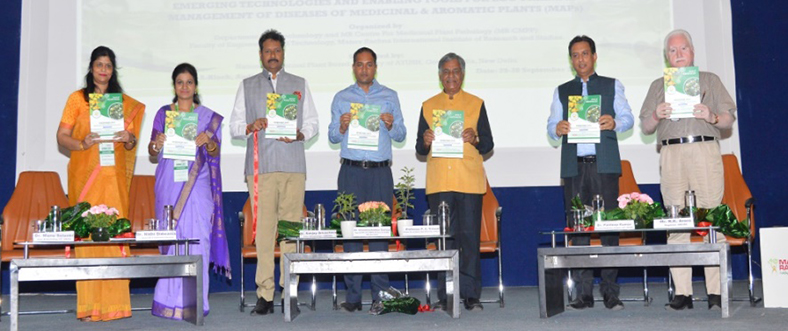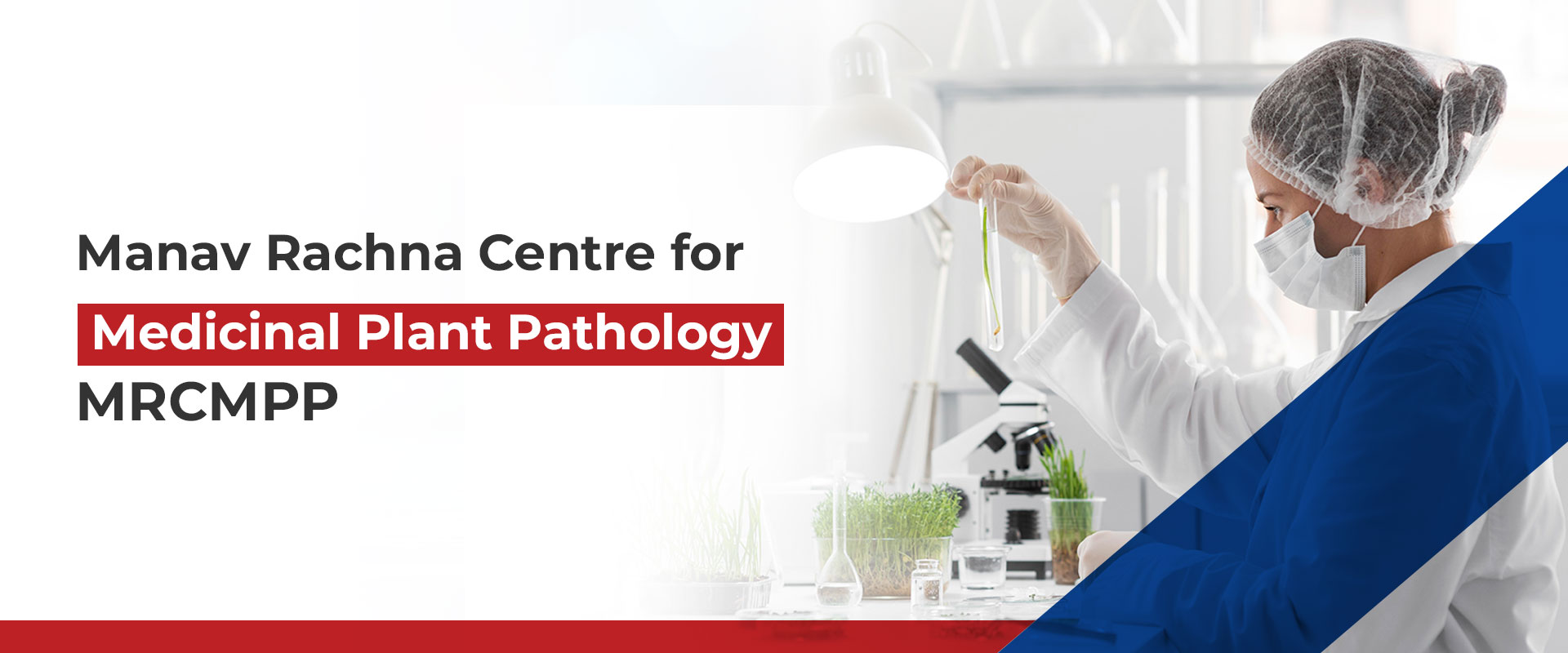
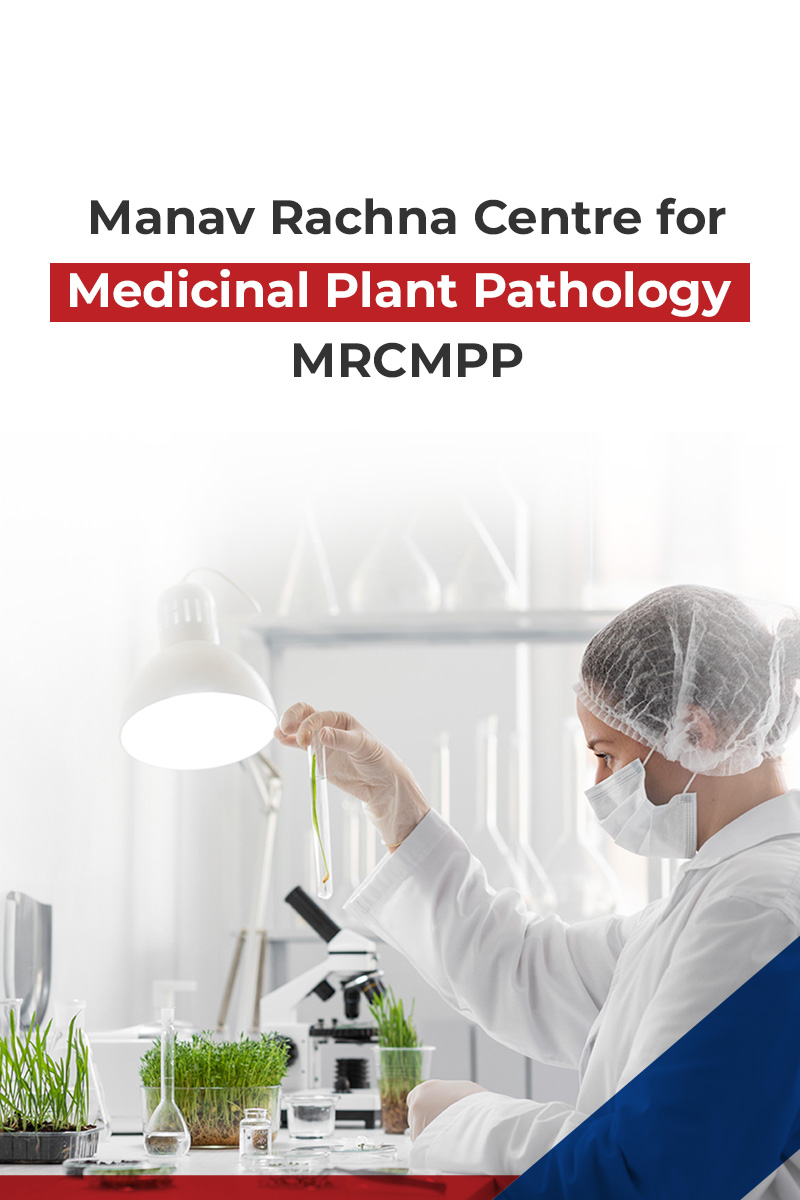
The Centre for Medicinal Plant Pathology (CMPP) at Manav Rachna is focused on promoting research, education, conservation, promotion, and popularisation of medicinal plants—addressing current and future challenges in the field of medicinal plant pathology. Guided by a team of seasoned plant pathologists and academicians, the centre envisions developing and providing innovative eco-friendly technologies and solutions through multidisciplinary high-quality research cost-effectively and sustainably.
Vision & Mission
VISION
The center aims to provide innovative, eco-friendly solutions for medicinal plant challenges through multidisciplinary, high-quality research.
MISSION
The center promotes sustainable farming of medicinal plants, addressing farmers' needs with eco-friendly, scientific solutions while encouraging local businesses and managing climate change impacts.
Our Key Offerings
The Centre for Medicinal Plant Pathology aims to provide a holistic approach towards ecological development, promotion, and innovation through the following offerings and services:
-

Medicinal/Herbal Garden
-

Plant Diagnostics clinic
-

Research Analysis Lab
-

Green House/Nursery
-

Demonstration Field
-

Herbarium
-

Field Germplasm Bank
-

Medicinal Plant Supply
-

Microgreens Cultivation
Constructive Projects & Work of CMPP
Aimed at developing sustainable solutions for an eco-friendly future, the Centre for Medicinal Plant Pathology has undertaken several key projects:
Projects
Startups
Consultancy
Major Research Areas
The centre is actively involved in the following research areas and divisions:

Crop Improvement

Biocontrol & Plant Disease Management

Climate Change Impact Studies
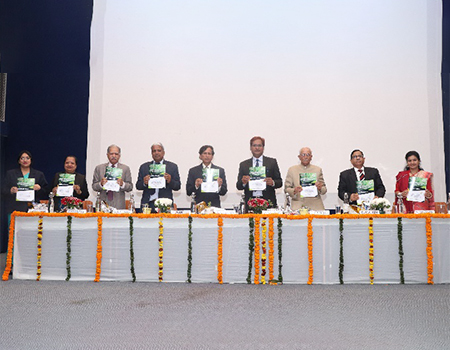
Extension Services
Host-Pathogen Relationship
Plant Systematics & Genetic Resources
Meet the CMPP Team
Research-backed innovation and progress are possible at the Centre for Medicinal Plant Pathology, thanks to the experienced faculty members and fraternity:

Dr. Nidhi Didwania
Director, Manav Rachna Centre For Medicinal Plant Pathology (MRCMPP)
Professor, Department of Biotechnology, SET, MRIIRS

Dr. Neeraj Dwivedi
Associate Professor, Manav Rachna Centre For Medicinal Plant Pathology (MRCMPP)
Department of Biotechnology, SET, MRIIRS

Dr. Neda Fatima
Associate Professor
Department of ECE, SET, MRIIRS

Mr. Yaman Hooda
Assistant Professor
Department of Civil Engineering, SET, MRIIRS

Dr. Arunangshu Mukherjee

Ms. Sneha Rai

Ms. Pushpa
Technical Assistant, Manav Rachna Centre For Medicinal Plant Pathology (MRCMPP)
Department of Biotechnology, SET, MRIIRS

Ms. Sadhana Shukla
PhD Scholar, Manav Rachna Centre For Medicinal Plant Pathology (MRCMPP)
Department of Biotechnology, SET, MRIIRS
Our Industry Partners and Collaborations
-
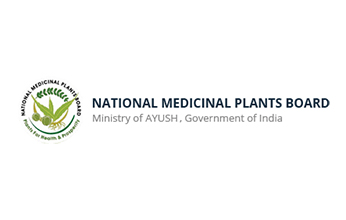
NMPB ( National Medicinal Plants Board)
-

SMPB(( State Medicinal Plants Board, Haryana)
-

The Energy and Resources Institute (TERI)
-
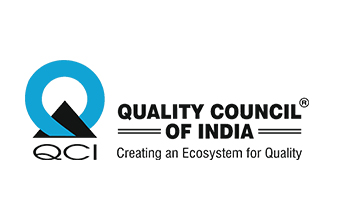
QCI (Quality Council of India)
-
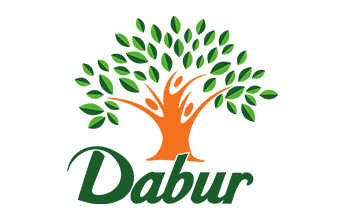
Dabur India Ltd.
-
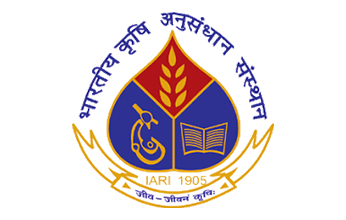
Indian Agricultural Research Institute(IARI)
-
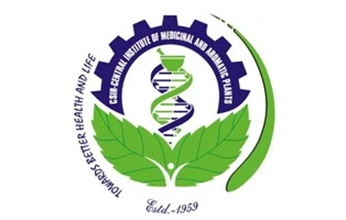
CSIR-Central Institute of Medicinal and Aromatic Plants (CIMAP)
-
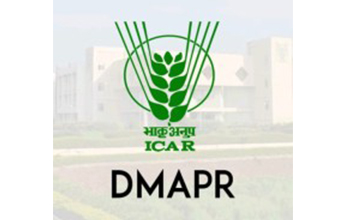
Directorate of Medicinal & Aromatic Plants Research, Anand, Gujarat
-
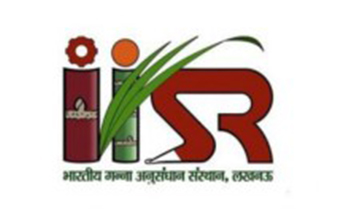
ICAR- Indian Institute of Sugarcane Research (IISR), Lucknow
-

Multani Pharmaceuticals Limited
-
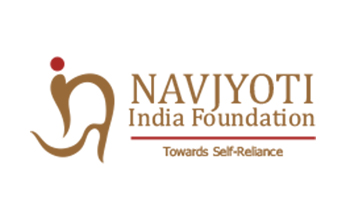
Navjyoti India Foundation
Awards & Recognitions
With impressive projects delivered and benchmarks set in the plant pathology field, the Centre for Medicinal Plant Pathology has bagged several awards and recognitions as elaborated below:
-

She Maps Award for research in the Medicinal & Aromatic Plant Sector
-

City President, Faridabad nominated by WICCI
-

Best Paper Award for Med Plant Care, May 2022 at NCIPM
-

First Prize in Technology For Rural Areas at Innoskill 2022
-

Best Oral Presentation Award for a eco-friendly bull's eye pathogen solution
-

Eco-Exhibitor Award at International Conference on "Environmental Challenges & Solutions"
-

Best Oral Presentation Award for “Plant Pathologists entrepreneurship: From idea to business”
-

Entrepreneur Award for the outstanding contribution in Biofertilizers & Biopesticides
-

Most Influential Woman Award for contribution in Agriculture and society by Brijbhoomi foundation.
-

Woman of the Future Award for significant achievement & contribution in Education, Agriculture
What's New
CMPP in the News
-

-

Article in hindi newspaper Navbharat Times “ Fungicides and pesticides are harmful.” dated 27th February 2017
-

Article in FET Technical Magazine (Ingenieur Sphere)-“Green homes are healthy homes” January 2018
-

Article in FET Technical Magazine (Ingenieur Sphere)-“Biopesticides-The Need of the Hour” November 2018
CMPP Impact: List of Publications & Reports
- Biopesticide Formulation and a process for the preparation thereof” dated 19th June 2017. Ref No.-201711021416 (Published on 21st Dec 2018) Granted on 20/09/2023, Patent No. 453155
- Biopesticide Oil Formulation” dated 30th October 2018. Ref No.-201811041013 (Published on 18th August 2020)
- PCT dated 30th October 2019 Ref. No. PCT/IN2019/050794 (International Patent) the publication No. WO 2020/089933 A1 on May 07, 2020
- US Patent Application No. 17/290,629 filed on April 30, 2021 for the invention entitled “BIO-PESTICIDE OIL FORMULATION” in the name of M/s Tricho Agronica Pvt. Ltd. and Indian Oil Corporation Limited May 31, 2021 Based on PCT International Application No. PCT/IN2019/050794 (Published Feb 2022)
- EUROPE Patent Application No. 19879063.6 filed on May 31, 2021, for the invention entitled “BIO-PESTICIDE OIL FORMULATION” in the name of M/s Tricho Agronica Pvt. Ltd. and Indian Oil Corporation Limited 02 June2021, Published on 20 July 2022.
- Pratima Singh, Mahak Sharma, Nidhi Didwania (21 September, 2023). Effect of processing techniques on nutritional parameters of antioxidant rich Pomegranate flowers. Agricultural Science Digest. Scopus ISSN Number- 0976-0547 Q4
- Sadhana Shukla, Pushplata Singh, Shruti Shukla, Sajad Ali, and Nidhi Didwania (1 July, 2023) Scope of Onsite, Portable Prevention Diagnostic Strategies for Alternaria Infections in Medicinal Plants. Biosensors 2023, 13, 701. ISSN Number- 2079-6374. Impact Factor-5.4 (Elseiver), Indexed in SCI, Pubmed, Scopus
- Surbhi Gupta, Nidhi Didwania Dinesh Singh and Srinivasa Nagappa Chowluru (2022) Microbial consortium: an eco-friendly approach against Alternaria brassicae in Indian mustard. Indian Phytopathology . Electronic ISSN 2248-9800, Print ISSN, 0367-973X, Scopus, SCImago, EBSCO, CAB Abstracts, Google Scholar.
- Surbhi Gupta and Nidhi Didwania (June 2021) Role of Medicinal plants as green pesticides against Alternaria blight. Bulgarian Journal of Agricultural Science (BJAS). Volume 27, Number-03, pp: 562-568 03-16.pdf (agrojournal.org)
- Surbhi Gupta, Nidhi Didwania and Dinesh Singh (September 2020) Biological control of mustard blight caused by Alternaria brassicae using plant growth promoting bacteria. Current Plant Biology, Volume 23, 100166
- Surbhi Gupta, Nidhi Didwania and Dinesh Singh (June 2021) Role of Medicinal plants as green pesticides against Alternaria blight. Bulgarian Journal of Agricultural Science (BJAS). Volume 27, Number-03, pp: 562-568 03-16.pdf (agrojournal.org)
- Surbhi Gupta, Nidhi Didwania and Dinesh Singh (September 2020) Biological control of mustard blight caused by Alternaria brassicae using plant growth promoting bacteria. Current Plant Biology, Volume 23, 100166
- Surbhi Gupta, Nidhi Didwania (November 2019) "Studies on The Impact Of Abiotic And Nutritional Factors On Mycelial Growth And Sporulation Of Alternaria brassicae Causing Blight In Indian Mustard" International Journal of Scientific & Technology Research Volume 8 - Issue 11, pp: 2996-2999.ISSN: 2277-8616 Elsevier Scopus, Google Scholar
- Divya Sharma, Seema Yadav and Nidhi Didwania (October 2019) Cumin (Cuminum cyminum L.): Chemical constituents and therapeutic potential. Ambient Science. Vol-06 (Sp-1) Web of Science ISSN- 2348 5191 (Print version); 2348 8980 (Online) National Cave Research and Protection Organization (Save Caves, India)
- Pushpa, Nidhi Didwania (October 2019) Cryopreservation Technique: A powerful tool for long term preservation of endangered medicinal plants. Ambient Science. Vol-06 (Sp-1) Web of Science, ISSN- 2348 5191 (Print version); 2348 8980 (Online), National Cave Research and Protection Organization (Save Caves, India). DOI: 10.21276/ambi.2019.06.sp1.ta02
- Deepti Sadana, Nidhi Didwania (August 2019) Integrated Disease Management of Bull’s eye pathogen infecting Lycopersicone esculantum (Tomato). Journal of Microbiology, Biotechnology and Food Sciences Vol. 9 (1), pp 53-57, ISSN:1338-5178 Web of Science, Scopus, EBSCO, Impact Factor after 3 years. doi:10.15414/jmbfs.2019.9.1.53-57.
- Nidhi Didwania, Swati Jain and Deepti Sadana. (March 2019) In vitro Phytotoxic Effect of Cadmium on Morphological Parameters of Allium cepa. (Scopus) Jordan journal of Biological Sciences. Volume 12, Number 1, pp: 37-41. ISSN: 2307-7166
- Deepti Sadana and Nidhi Didwania (2018) Evaluation of tomato genotypes for resistance against Alterneria solani causing early blight under field conditions, Faridabad,India. Asian Jr. of Microbiol. Biotech. Env. Sc. Vol. 20, No. (3) : 1009-1012.(Scopus)H Index Rating 9 NAAS Rating – 4.93
- Deepti Sadana and Nidhi Didwania (2017) Screening of various organic treatments against leaf blight disease of tomato in vitro and green house conditions. Der Pharmacia Lettre. Volume 9(6): 1-7, U.K 2016 (Scopus) Impact Factor (2 years): 1.96,2016 Impact Factor (5 years): 5.053
- Vandana Nandal, Manu Solanki, and Nidhi Didwania (December 2016) Potential of Zinc Solubilizing Bacterial Inoculants in Fodder Crops. International Journal of Engineering Technology Science and Research, Volume 3, Issue 12 2016 pp1-4, Impact factor-2.1
- Nidhi Didwania, Manu Solanki and Chanpreet Kaur (December 2016) Selection of strain and optimization of Asparginase production in Trichoderma harzianum. International Journal of Engineering Technology, Management and Applied Sciences, Volume 4, Issue 12, ISSN 2349-4476 pp31-36 Impact factr-2.24
- Deepti Sadana, Nidhi Didwania (April 2016) Evaluation of fungicides, plant extracts and Trichoderma Harzianum against early blight disease of tomato plants under in vitro and greenhouse conditions. African Journal of Science and Research. Vol. 5, No. (2).
- Deepti Sadana and Nidhi Didwania. (April-June, 2015) Bioefficacy of Fungicides and Trichoderma harzianum Against Alternaria solani Causing Early Blight of Tomato. Journal of Agroecology and Natural Resource Management (JANRM). Vol. 2, No. (3): 181-186.
- Nidhi Didwania and P. C. Trivedi (Dec, 2014) Mycotoxins: A review of metabolism and biological approaches to counteract the production in food. MR International Jr. of Engineering and Technology. Vol. 6, No. (2): 38-42
- Nidhi Didwania, Deepti Sadana, Neha Katyal. (Jan, 2013). A Review on Current Research Advancement on Wilt Disease of Psidium Guajava L. with Special Reference to Management. International Journal of Science and Advanced Technology, Volume 3 (1) p
- Manisha Joshi and Nidhi Didwania (2013). Optimization of Pretreatment of Wheatstraw for Bioethanol Production. International Journal of Pharma Bioscience and Technology, 1(2),
- Nidhi Didwania and Manisha Joshi ( July,2013) Mycotoxins:A critical review on occurrence and significance Int J Pharm Pharm Sci, Vol 5, Issue 3,1014-1019 (Scopus, Elseiver) Impact-
- Nidhi Didwania, Deepti Sadana and P. C. Trivedi (2013) Antibacterial activity of a few medicinal plants against Xanthomonas campestris pv. campestris. Int. J. Res. Pharm. Sci., 4(2), 177-182(Scopus)
- Nidhi Didwania, Manu Solanki and P. C. Trivedi (July-Sept, 2013) Biocontrol of Alternaria blight of Cauliflower by Plant-Growth Promoting Rhizobacteria. Asian Jr. of Microbiol. Biotech. Env. Sc. Vol. 15, No. (3) : 567-572.(Scopus)H Index Rating 9 NAAS Rating - 2.6
- Didwania, N. and Trivedi, P. C. (2011). Variability in Indian isolates of Fusarium oxysporum f. sp. cucumerinum causing cucumber wilt. J. Phytol Research. Vol 24 (2) 177-181
- Didwania, N. and Trivedi, P. C. (2010). Evaluation of different AM fungi against Meloidogyne-Fusarium complex infecting cumin. J of Environmental biology and Conservation. Journal of Environment biology and Conservation.Vol (15)
- Didwania, N. and Trivedi, P. C. (2010). Efficacy of Trichoderma spp. And Paecilomyces lilacinus against Meloidogyne-Fusarium complex infecting cumin (Cuminum cyminum L). J. Phytol Research.Vol 23(2)271-277pp
- Didwania, N. and Trivedi, P. C. (2010). Biocontrol effects of Trichoderma harzianum and Gliocladium virens and Fusarium oxysporum f. sp. cumini causing wilt of cumin.J. of Mendel Vol.27,1-2 pp
- Sharma, P. and Sharma, N. (2007) Hypovirulence as a tool of biological control against Sclerotium rolfsii. J ecofriend Agric, 2(1), 46-50.
- Sharma, N. and Trivedi, P. C. (2005). Microbial Bioagents: Economic multiplication and management of fungal-nematode complex on cumin. Indian Journal of Biotechnology, N. Delhi. Vol (4) 419-421 (Scopus)
- Sharma, N. and Trivedi, P. C. (2003). Studies on the interaction between Meloidogyne incognita and Fusarium oxysporum f. sp. cumini. J. Phytol Research. Vol. 16(1) 5-8
- Sharma, N. and Trivedi, P. C. (2003). Evaluation of fungal antagonists, plant extracts and oil-cakes against Fusarium oxysporum f. sp. cumini causing wilt of cumin (Cuminum cyminum L). Journal of Indian Botanical Society, Vol (84)1-4 (U)
- Sharma, N. and Trivedi, P. C. (2002). Screening of leaf extracts of some plants for their nematicidal and fungicidal properties against M. incognita and Fusarium oxysporum. Asian journal of Experimental Sciences.Vol.16, No. 1 & 2, 21-28 pp


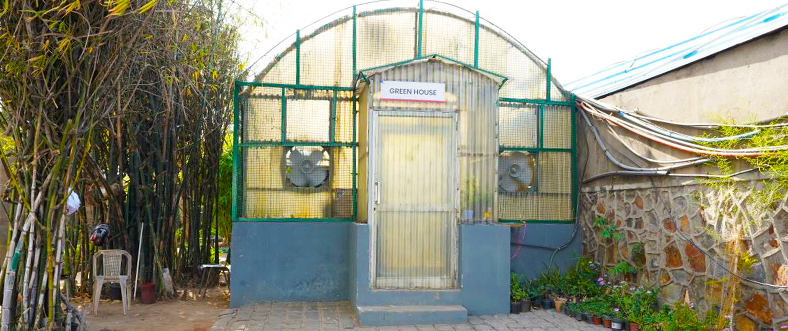
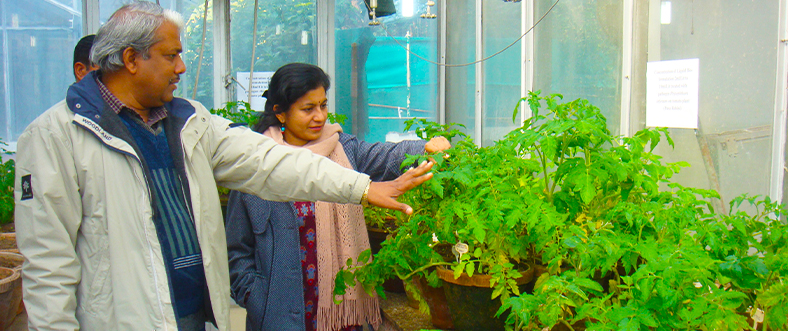
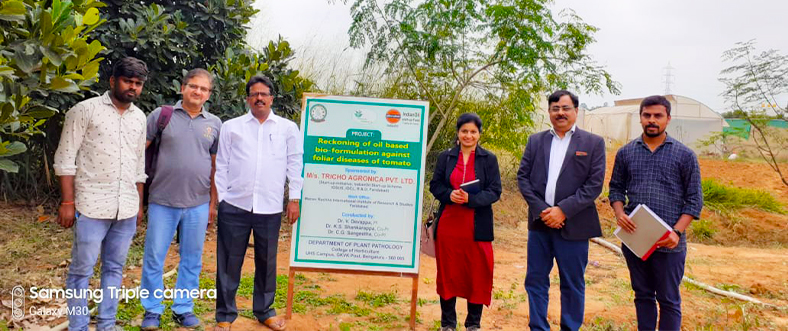
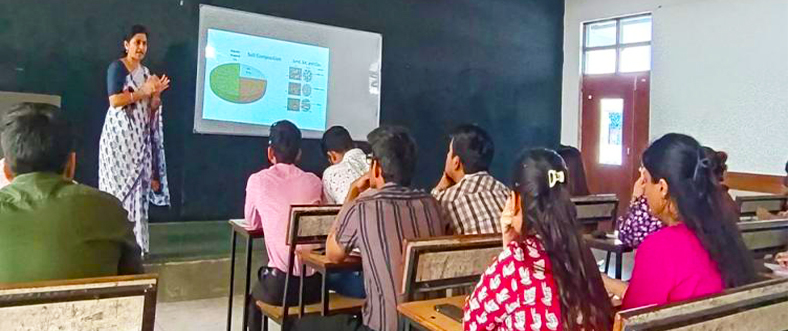

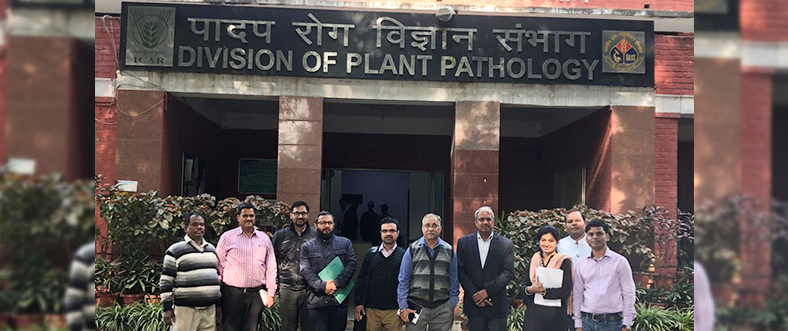

.jpg)
.jpg)
